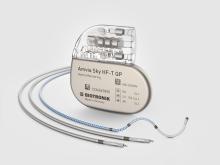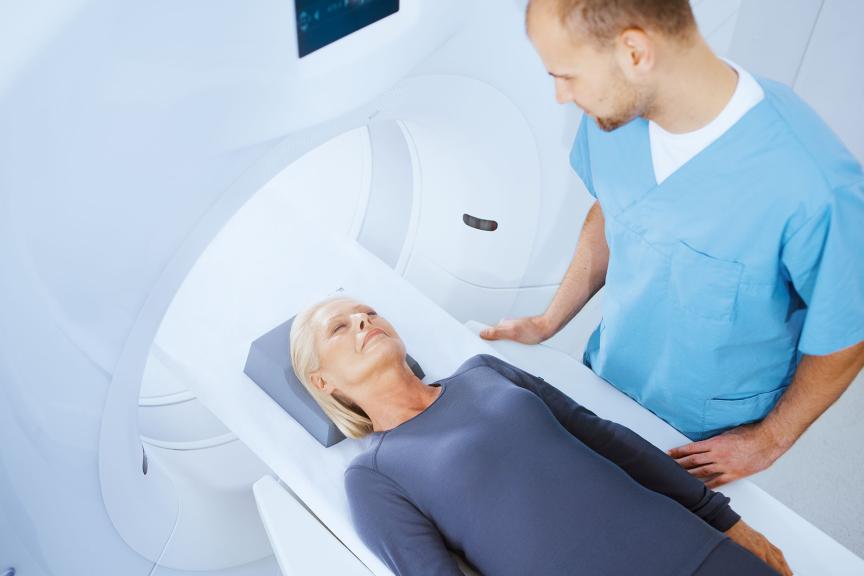Rivacor 7 HF-T QP/HF-T
Simplified and optimized CRT for up to 9 years1
Heart failure is tough to live with and can be complex and time-consuming to treat and manage. It’s these real life challenges that Acticor 7 CRT-D systems are engineered to deal with. These new and smaller systems simplify treatment and therapy for up to 9 years1, and when used with BIOTRONIK Home Monitoring technology, they have been clinically proven to help prolong life further30.
Product Highlights
9 Years Longevity. 6 Years Warranty
Acticor CRT-Ds have an extended battery life of 9 years9, supported by a full 6-year warranty
Full 3T MRI. Autodetected
All Acticor devices feature ProMRI, which gives full and uncompromised access to high-resolution MRI, with full-body scanning and no exclusion zone
Continuous CRT Optimization
All these beneficial technologies are also available with unique CRT-DX technology that provides complete atrial diagnostics without an atrial lead
Downloads & Related Links
Contact Us
References
1. Contoured housing; Acticor/Rivacor CRT-D QP: 60x75x10mm; 35ccm; CRT-D: 60x71.5x10mm; 33ccm; 2. as part of an MR conditional system; 3. Post-Market observation; interim-analysis, December 21, 2018. Data on file; 4. Device shape analysis, February 2019. Data on file; 5. Post-Market observation; interim-analysis, December 21, 2018. Data on file; 6. Post-Market observation; interim-analysis, December 21, 2018. Data on file; 7. Device shape analysis, February 2019. Data on file; 8. Post-Market observation; interim-analysis, December 21, 2018. Data on file; 9. Acticor/Rivacor HF-T QP, 9.3 years @ 60 ppm; RA 15%, RV/LV 100% pacing, RA/RV/LV @ 2.5 V/0.4 ms; 500 Ohms, 2 max. energy shocks/year. Data on file; 10. Acticor/Rivacor HF-T QP: 9.3 years @ 60 ppm; RA 15%, RV/LV 100% pacing, RA/RV/LV @ 2.5 V/0.4 ms; 500 Ohms, 2 max. energy shocks/year: Data on file vs. Medtronic 3T FBS; CLARIA (AMPLIA, COMPIA) MRI QUAD CRT-D SureScan: 6.8 years; Competitor device manuals as of Nov. 2018; 11. Lee DS et al. Evaluation of Early Complications Related to De Novo Cardioverter Defibrillator Implantation. Insights From The Ontario ICD database. J Am Col Cardiol 2010; 55:774-82; 12. Fact file: Cardiac Imaging with MRI, CT and Nuclear Techniques, British Heart Foundation. January 2010; 13. When patients are monitored by BIOTRONIK Home Monitoring. See ProMRI® manual for all details;14. Hindricks G et al. Implant-based multiparameter telemonitoring of patients with heart failure (IN-TIME): a randomised controlled trial. The Lancet. 2014; 384 (9943): 583–590; 15. Varma N et al. Efficacy and Safety of Automatic Remote Monitoring for Implantable Cardioverter-Defibrillator Follow-Up: The Lumos-T Safely Reduces Routine Office Device Follow-Up (TRUST) Trial. Circulation, 2010;122: 325 – 332; 16. Hindricks G et al. Implant-based multiparameter telemonitoring of patients with heart failure (IN-TIME): a randomised controlled trial. The Lancet. 2014; 384 (9943): 583–590; (3.4% in the Home Monitoring Group vs. 8.7% in the control group); 17. Ricci R P et al. Long-term patient acceptance of and satisfaction with implanted device remote monitoring. Europace (2010) 12, 674-679; 18. Ricci R P et al. Long-term patient acceptance of and satisfaction with implanted device remote monitoring. Europace (2010) 12, 674-679; 19. Hindricks G et al. Implant-based multiparameter telemonitoring of patients with heart failure (IN-TIME): a randomised controlled trial. The Lancet. 2014; 384 (9943): 583–590; 20. Vs. 55% - Crossley G H, Boyle A, Vitense H, et al. The CONNEXT (Clinical Evaluation of Remote Notification to Reduce Time to Clinical Decision) Trial. JACC. 2011; 57(10):1181-1189 [for bar chart comparison only]; 21. Ricci R P et al. Long-term patient acceptance of and satisfaction with implanted device remote monitoring. Europace (2010) 12, 674-679; 22. Performance analysis. Data on file, 2018; 23. Performance analysis. Data on file, 2018; 24. Martin DO et al. Heart Rhythm 2012;9(11):1807-1814; 25. van Gelder BM, Bracke FA, Meijer A, Pijls NH. The hemodynamic effect of intrinsic conduction during left ventricular pacing as compared to biventricular pacing. J Am Coll Cardiol 2005;46:2305–2310; 26. Acticor/Rivacor HF-T QP, 10.8 years @ 60 ppm; RA 15%, RV 0%, LV 100% pacing, RA/RV/LV @ 2.5 V/0.4 ms; 500 Ohms, 2 max. energy shocks/year. Data on file; 27. Post-Market observation; interim-analysis, December 21, 2018. Data on file; 28. QP models only; 29. Post-Market observation; interim-analysis, December 21, 2018. Data on file; 30. Hindricks G et al. Implant-based multiparameter telemonitoring of patients with heart failure (IN-TIME): a randomised controlled trial. The Lancet. 2014; 384 (9943): 583–590; (3.4% in the Home Monitoring Group vs. 8.7% in the control group).








